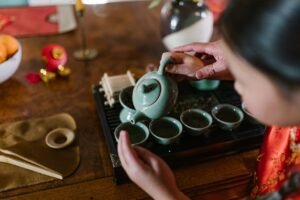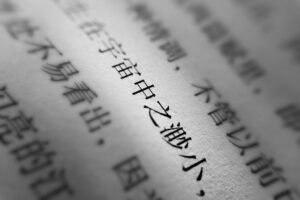Table of Contents
ToggleIntroduction
The Chinese family structure is a fundamental aspect of Chinese society, deeply rooted in Confucian principles that emphasize hierarchy, respect, and duty. This intricate system places significant importance on familial roles, relationships, and the responsibilities that come with them. The complexity of these family titles often surprises those unfamiliar with Chinese culture. However, a deeper understanding of these titles and their cultural significance offers a unique perspective on the values and social dynamics that have shaped China for centuries.
Hierarchy and Generational Differences
In Chinese culture, family hierarchy is a crucial element that dictates the dynamics within the family. This hierarchy is predominantly based on generational standing and age, creating a well-defined structure where respect and duty are paramount. Each family member has a specific title that reflects their position within this hierarchy.
Grandparents
- 祖父 (zǔfù) and 祖母 (zǔmǔ): The paternal grandparents, where 祖父 refers to the grandfather and 祖母 to the grandmother. These titles highlight the importance of the paternal lineage in traditional Chinese society. Grandparents play a significant role in raising grandchildren and instilling family values.
- 外公 (wàigōng) and 外婆 (wàipó): The maternal grandparents, with 外公 being the grandfather and 外婆 the grandmother. These terms emphasize the equally significant role of the maternal side in a child’s upbringing, often contributing to a nurturing environment and offering additional support.
Parents
- 父亲 (fùqīn) and 母亲 (mǔqīn): These are the formal terms for father and mother. They are used in formal contexts and written communication. In everyday conversation, the terms 爸爸 (bàba) for father and 妈妈 (māma) for mother are more commonly used, reflecting a more affectionate and informal tone. Parents are seen as the primary authority figures and are responsible for providing for and educating their children.
Titles Based on Sibling Order
The titles for siblings in Chinese culture are highly specific, reflecting not just the direct relationship but also the order of birth and gender.
- 哥哥 (gēge): Older brother. This title is used by younger siblings to show respect to their elder brother. In many families, the older brother is expected to take on more responsibilities and often acts as a role model.
- 姐姐 (jiějie): Older sister. Younger siblings use this term to address their elder sister respectfully. The older sister often helps with household duties and takes care of the younger siblings.
- 弟弟 (dìdi): Younger brother. This title is used by older siblings when referring to their younger brother. Younger brothers are often expected to learn from their older siblings and gradually take on more responsibilities as they grow older.
- 妹妹 (mèimei): Younger sister. Older siblings use this term for their younger sister. Similar to younger brothers, younger sisters are nurtured and guided by their older siblings.
Extended Family Titles
For extended family members, the titles become more detailed, indicating the specific relationship and whether they are from the paternal or maternal side of the family.
Aunts and Uncles
- 叔叔 (shūshu): Younger brother of one’s father. This title reflects the importance of acknowledging the specific position within the paternal lineage. Younger uncles are often close in age to the elder siblings and play a friendly and supportive role.
- 伯伯 (bóbo): Older brother of one’s father. The differentiation between younger and older siblings in titles underscores the respect accorded based on age. Older uncles are seen as authority figures and are treated with a high level of respect.
- 姑姑 (gūgu): Sister of one’s father. This term indicates the relationship on the paternal side. Aunts on the paternal side are involved in the family gatherings and support their brothers’ families.
- 舅舅 (jiùjiu): Brother of one’s mother. The maternal uncle’s role is often seen as more nurturing and supportive. Maternal uncles are usually very close to their nieces and nephews.
- 姨妈 (yímā): Sister of one’s mother. This title recognizes the maternal aunt’s role in the family. Maternal aunts often play a significant role in family events and provide emotional support.
Cousins
In Chinese culture, even cousins have specific titles based on their relation to the individual’s parents and the gender of the cousin. For example:
- 堂兄 (tángxiōng): Older male cousin on the father’s side.
- 堂姐 (tángjiě): Older female cousin on the father’s side.
- 表弟 (biǎodì): Younger male cousin on the mother’s side.
- 表妹 (biǎomèi): Younger female cousin on the mother’s side.
In-Laws and Extended Family
Titles extend to in-laws and other members of the extended family, reflecting the importance of these relationships within the family unit.
- 公公 (gōnggong): Father-in-law (husband’s father). This title is used by a wife to show respect to her husband’s father. The father-in-law is an authority figure and is often consulted on major family decisions.
- 婆婆 (pópo): Mother-in-law (husband’s mother). This term is used by a wife to address her husband’s mother. The mother-in-law often helps with household duties and child-rearing.
- 岳父 (yuèfù): Father-in-law (wife’s father). A husband uses this term to show respect to his wife’s father. The father-in-law is treated with the same respect as one’s own father.
- 岳母 (yuèmǔ): Mother-in-law (wife’s mother). This title is used by a husband to address his wife’s mother. The mother-in-law plays a nurturing role and provides support to her daughter’s family.
- 嫂子 (sǎozi): Older brother’s wife. This term shows the hierarchical respect within the family. The older brother’s wife is often involved in family gatherings and supports her husband’s family.
- 弟媳 (dìxí): Younger brother’s wife. This title is used to address the wife of one’s younger brother. The younger brother’s wife is integrated into the family and participates in family activities.
- 姐夫 (jiěfu): Older sister’s husband. The husband of one’s older sister. The older sister’s husband is treated with respect and becomes part of the family.
- 妹夫 (mèifu): Younger sister’s husband. The husband of one’s younger sister. The younger sister’s husband is welcomed into the family and is involved in family matters.
Cultural Significance and Idioms
The Chinese family structure and the titles associated with it are deeply embedded in cultural values and idioms that emphasize respect, duty, and harmony within the family.
Key Idioms and Phrases
- 长幼有序 (zhǎng yòu yǒu xù): “Seniors and juniors each have their place.” This idiom emphasizes the importance of respecting the family hierarchy, where each member knows their role and position.
- 孝顺 (xiàoshùn): Filial piety. This concept is central to Confucianism and Chinese culture, representing the virtue of respect and care for one’s parents and elders.
- 家和万事兴 (jiā hé wàn shì xīng): “A harmonious family prospers in everything.” This phrase underscores the belief that family harmony is crucial for success in all aspects of life.
- 父母恩重如山 (fù mǔ ēn zhòng rú shān): “Parents’ grace is as heavy as a mountain.” This idiom highlights the deep gratitude and respect owed to one’s parents for their sacrifices and care.
- 四世同堂 (sì shì tóng táng): “Four generations under one roof.” This expression conveys the ideal of extended family living together harmoniously, illustrating the importance of family unity.
- 兄友弟恭 (xiōng yǒu dì gōng): “Brothers are friendly, and younger siblings are respectful.” This phrase highlights the ideal relationships among siblings, emphasizing mutual respect and support.
- 父慈子孝 (fù cí zǐ xiào): “Fatherly kindness and filial piety.” This idiom stresses the importance of a father’s kindness and the corresponding duty of the child to show filial piety.
- 母仪天下 (mǔ yí tiān xià): “A mother’s virtue influences the whole world.” This saying reflects the high regard for a mother’s role in shaping the moral fabric of society.
- 望子成龙 (wàng zǐ chéng lóng): “Hoping one’s son will become a dragon.” This idiom reflects the aspiration parents have for their children to achieve great success.
- 望女成凤 (wàng nǚ chéng fèng): “Hoping one’s daughter will become a phoenix.” Similar to the previous idiom, it expresses the hope that daughters will achieve greatness.
Practical Use and Social Context
Understanding these titles is essential for navigating social interactions in China, especially in formal and family settings. Addressing someone with the correct title shows respect and awareness of social norms, which is highly valued in Chinese culture. When meeting someone new, it is common to ask about their family members to understand their place within the family hierarchy and show respect.
Example Scenarios
- Visiting Relatives During Chinese New Year: During the Chinese New Year (春节, Chūn Jié), it is customary to visit relatives and address them using the correct family titles. For example, when visiting a paternal uncle, one would say, “伯伯,新年好!” (Bóbo, xīn nián hǎo!), which means “Uncle, Happy New Year!” This practice reinforces familial bonds and ensures that respect is given to each member according to their status and relationship.
- Introducing Family Members: When introducing family members to friends or colleagues, using the correct titles helps clarify relationships and show respect. For instance, “这是我的哥哥,他叫李华” (Zhè shì wǒ de gēge, tā jiào Lǐ Huá), meaning “This is my older brother, his name is Li Hua.”
- Business Contexts: In professional settings, understanding and using appropriate titles can enhance relationships and facilitate smoother interactions. For instance, when a colleague mentions their “嫂子” (sǎozi), it is understood that they are referring to their older brother’s wife. Acknowledging the family hierarchy can show respect and cultural awareness, which is appreciated by Chinese counterparts.
Word List
| Chinese | Pinyin | English Translation |
|---|---|---|
| 祖父 | zǔfù | Paternal grandfather |
| 祖母 | zǔmǔ | Paternal grandmother |
| 外公 | wàigōng | Maternal grandfather |
| 外婆 | wàipó | Maternal grandmother |
| 父亲 | fùqīn | Father |
| 母亲 | mǔqīn | Mother |
| 哥哥 | gēge | Older brother |
| 姐姐 | jiějie | Older sister |
| 弟弟 | dìdi | Younger brother |
| 妹妹 | mèimei | Younger sister |
| 叔叔 | shūshu | Younger brother of one’s father |
| 伯伯 | bóbo | Older brother of one’s father |
| 姑姑 | gūgu | Sister of one’s father |
| 舅舅 | jiùjiu | Brother of one’s mother |
| 姨妈 | yímā | Sister of one’s mother |
| 公公 | gōnggong | Father-in-law (husband’s father) |
| 婆婆 | pópo | Mother-in-law (husband’s mother) |
| 岳父 | yuèfù | Father-in-law (wife’s father) |
| 岳母 | yuèmǔ | Mother-in-law (wife’s mother) |
| 嫂子 | sǎozi | Older brother’s wife |
| 弟媳 | dìxí | Younger brother’s wife |
| 姐夫 | jiěfu | Older sister’s husband |
| 妹夫 | mèifu | Younger sister’s husband |
| 堂兄 | tángxiōng | Older male cousin on the father’s side |
| 堂姐 | tángjiě | Older female cousin on the father’s side |
| 表弟 | biǎodì | Younger male cousin on the mother’s side |
| 表妹 | biǎomèi | Younger female cousin on the mother’s side |
Conclusion
The Chinese family structure is a rich tapestry of relationships, each title carrying with it deep cultural significance and respect. By understanding these titles and their proper usage, one can better appreciate the values and social norms that underpin Chinese society. This knowledge is invaluable for anyone looking to deepen their connection with Chinese culture and navigate familial relationships with respect and understanding. The Chinese family is not just a social unit but a reflection of the broader societal values of hierarchy, duty, and harmony, making it a crucial aspect of Chinese life and culture.








